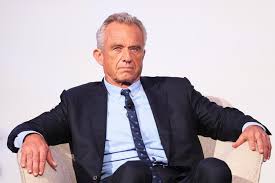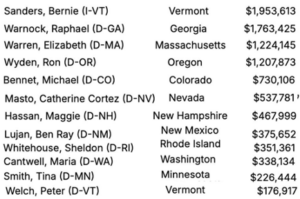US Health Care: The Good, the Bad, and the Ugly

Robert F. Kennedy Jr.’s nomination to be Director of Health and Human Services (HHS) has been a major issue of concern for not only the Democrats and their media, but also for some prominent Republicans and, shockingly, The Wall Street Journal.
The main issue, if you believe the rhetoric, is the question of whether he has the experience, expertise, and knowledge to head up this massive governmental bureaucracy.
Those who oppose his nomination argue that his bias towards healthy living and natural medicine has devolved into a belief in all sorts of unproven and scary “conspiracy theories” – most notably his contention that vaccines have been oversold to Americans by Big Pharma, that some of them (like the COVID vaccine) are ineffective, and others (like the Hepatitis B vaccine) are dangerously overprescribed to infants.
Those who favor his nomination – such as yours truly – believe that health care in the US is not operating to promote healthy outcomes for Americans, but rather to increase profits for Big Pharma (the multibillion-dollar drug companies), Big Food (the multibillion-dollar grain and sugar industry), and Big Medicine (the multibillion-dollar corporate triad of hospitals, health insurance, and legal businesses supported by lobbyists, the NIH, the CDC, and other government bureaucracies), as well as the hundreds of officials in Washington who rake in big bucks each year in political contributions from all of the above.
Think I’m spouting a conspiracy theory?
Consider where the US health care system stands in relation to the rest of the world: the good, the bad, and the ugly…
The Good
There are three “good” things that are often cited about the American health care system:
* The World Health Organization ranks the US #1 in the world for “responsiveness to the needs and choices of the individual patient.”
* Americans have had more access to new cancer fighting drugs than Canadians or Europeans because of the length of their approval processes. In some cases, according to the Fraser Institute, it took Canada more than 180 days longer to green light a new cancer treatment than in the US.
* The US leads the world in new medical innovations. A 2009 study by the Cato Institute, for example, showed that American scientists won the Nobel Prize in 33 out of the previous 40 years, whereas scientists from the entire rest of the world won it in only 25. (Often it was shared between Americans and non-Americans.) Additionally, of the top 27 drugs and devices, US physicians, companies, and scientists had a hand in developing 20 of them, whereas European physicians, companies, and scientists had a hand in only 14.
The Bad
* Health care costs in the US are enormous. The country spent $3.3 trillion on health care in 2023 – more than any other country per capita ($11,582 per person) and as a percentage of GDP (17.7%).
* Almost two-thirds of that $3.3 trillion cost – 64% – is paid for by American tax dollars, and that amount is growing. Health care taxes are higher in the US than in any other country – even those with universal health care programs.
* Inflated pharmaceutical prices are another huge factor. Americans spend an average of $858 per person on prescription drugs, about twice as much as people in Australia.
The Ugly
If the huge cost Americans pay for their health care – through taxes, health insurance fees, and out-of-pocket costs – resulted in longer and healthier lives, it could be justified. But that is not the case. The ugly truth is that by almost every metric, Americans are less heathy than most of the world, including many developing countries!
Don’t believe me? Take a look at this:
* The US has lower life expectancy at birth, higher death rates for treatable conditions, and higher maternal and infant mortality rates than other high-income countries.
* America’s infant mortality rate is higher than that of 47 other countries, including many much less developed countries and many countries with government-run health care systems.
* Nearly 75% of Americans are overweight or obese. Nearly 40% have prediabetes. America’s rate of drug overdose deaths far exceeds that of any other wealthy country, and has jumped 50% since 2019. (More than 107,000 Americans died of a drug overdose in 2023.)
Which brings me to the question…
So… why RFK Jr.?

I’ve been publishing newsletters on health for nearly 40 years. When I began, I would have had the same negative impression of RFK Jr. that his detractors now have. After all, it’s the only logical conclusion you could have if you get your news and information about health and medicine from the mainstream media.
Back then, I thought that any ideas I heard that were contrary to the established orthodoxy of modern medicine were baseless beliefs held by fringe religious sects or other nutty groups.
But since then, I’ve probably read 10,000 scientific studies (mostly executive summaries, to be honest), worked with dozens of doctors and scientists (with a natural health bias, to be sure), and even published a few pamphlets on health and medical falsehoods supported by special interest groups (including one I wrote about the widely held belief that sun causes skin cancer – melanoma, the one that kills).
I am now convinced that there is a reason why the US spends more money on health care than any other country in the world, and yet Americans are consistently ranked at the bottom in most of the important measures of health and wellness.
Given what I now know, I am strongly prejudiced in favor of RFK Jr.’s appointment to head up HHS for the following reasons:
* His decades-long experience litigating against Big Pharma, Big Food, and Big Medicine. In a feat of logical absurdity, some of those opposing RFK Jr.’s nomination have tried to destroy his credibility by suggesting that this experience makes his integrity questionable. Huh? The man has made his living fighting the lies and corruption of the Health Industrial Complex, not profiting from it, as his detractors – including the Dems opposing him in Congress and the major liberal and conservative media – have done.
* As an advocate for public health against Big Pharma, Big Medicine, and Big Food, RFK Jr. knows more about the deceptive marketing and PR tactics that these mega-industries have been practicing over the last several decades than 98% of our DC representatives. He also knows from personal observation the damage that these industries have caused, both in terms of the cost of health care and the terrible results.
* In the four+ decades he’s been battling the bad guys, he’s focused on what the doctors and health experts I trust believe is the elephant in the room – the indisputable fact that the major causes of sickness and death in America – obesity, heart disease, cancer, and diabetes – have nothing to do with viruses.
Let’s look at the congresspeople currently opposing RFK Jr.’s nomination. Here’s a list of the politicians who received the largest total political donations from Big Pharma last year:

Since RFK Jr. does not profit from promoting the half-truths and outright lies of the Health Industrial Complex and their stooges, as head of HHS he will be able to make policy decisions that are not dictated by ad fees or political donations.
But I think his main attribute is that, like many other Trump’s nominees, RFK Jr. is a Beltway outsider, which means that he has no loyalty to the tens of thousands of bureaucrats in DC that make their money by perpetuating our failed health care system. He won’t have any hesitation about getting rid of droves of them, which would be a huge step forward in making health care cheaper and infinitely better for all Americans.
Here he is providing his own bona fides for the job.
